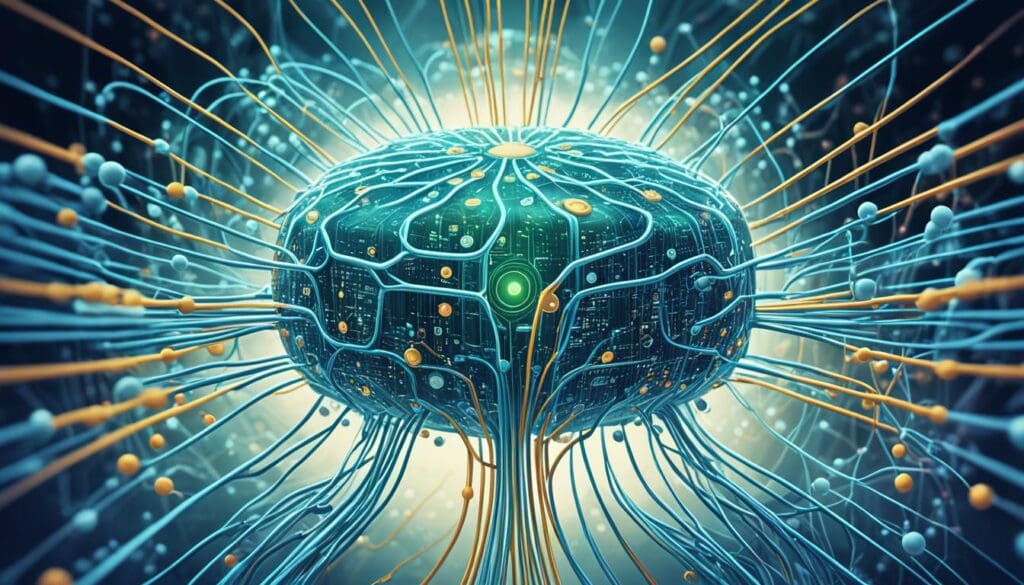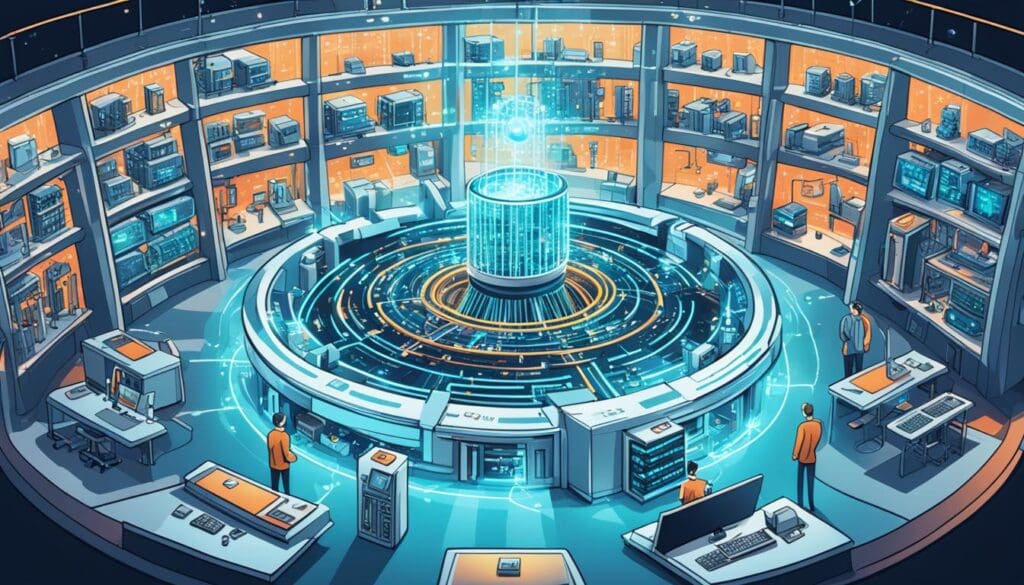“The future is not some place we are going to, but one we are creating.” – John Sculley, former CEO of Apple
Quantum computing and artificial intelligence are coming together to change the world. This new mix, called Quantum AI, uses quantum mechanics to make AI faster and more efficient. It’s like a superpower for computers.
This new tech is set to change many areas, from finding new medicines to keeping data safe online. It’s going to do things that old computers can’t even dream of.

Key Takeaways
- Quantum computing uses quantum physics to make computers much faster and more efficient than regular ones.
- Quantum machine learning algorithms, like Quantum Support Vector Machines (QSVM), work with high-dimensional data better using quantum phases.
- Quantum annealing uses quantum tunneling to solve tough problems in AI and machine learning.
- Quantum Machine Learning (QML) makes handling high-dimensional data easier with quantum entanglement and superposition.
- Quantum computing is moving from theory to real-world use, with the creation of universal, programmable quantum computers.
Convergence of Quantum Computing and AI
The meeting of quantum computing and artificial intelligence (AI) is changing the game. Quantum computers can solve some problems way faster than old computers. This makes them great for speeding up AI tasks like complex optimization and machine learning.
Exponentially Increased Processing Power
Quantum parallelism lets quantum computers check out many options at once. This is a big win for handling big data sets. It means AI systems can find patterns and insights much faster than before.
Machine Learning Models That Have Been Optimized
Quantum computing and AI together can make machine learning models better. Quantum algorithms like quantum support vector machines and quantum neural networks might be faster and more accurate than old ones. This could lead to quicker and more precise machine learning models.
By 2024, the convergence of quantum computing and artificial intelligence is expected to unlock limitless potential in various industries.
Quantum computing and AI are set to change many fields like healthcare, finance, cybersecurity, and environmental monitoring. They will help organizations solve tough problems much faster and more accurately.
Quantum AI: The Frontier of Enhanced Intelligence
Quantum Artificial Intelligence (QAI) is a new field that mixes quantum computing with artificial intelligence. This blend could change how AI works, making it faster, more efficient, and accurate. Quantum AI uses quantum mechanics to do things classical computers can’t, opening up new ways to improve machine learning and data handling.
When Generative AI meets Quantum Computing, we see big changes in fields like healthcare, finance, and art. Quantum computers work way faster than old computers, thanks to qubits. Generative AI can make new stuff by learning from old data. Together, they open up new possibilities that could change many areas.
This mix of AI and quantum computing could lead to faster healthcare treatments, more precise financial models, and art as good as human-made. But, we face challenges like the tech being in its early stages and needing special hardware.
Exploring quantum AI shows us a world full of new chances and tech potential. It could mean better cybersecurity and more tailored tech experiences. The blend of AI and quantum computing is key to a future of unmatched intelligence and power.
“The fusion of Generative AI and Quantum Computing is anticipated to result in breakthrough advancements across industries like healthcare, finance, and art.”
Quantum Machine Learning: When AI Meets Quantum Computing
The mix of quantum computing and artificial intelligence is changing the game. Quantum AI uses quantum mechanics to do complex tasks fast. This means it can process data and solve problems much quicker than before.
This new tech is a big deal for many fields, from science to healthcare. It’s like a superpower for solving tough problems.
Quantum Artificial Intelligence (QAI) blends quantum computing with AI to make AI models work better. Google’s TensorFlow Quantum is a key tool in this area. It helps link quantum computing with machine learning.
QAI aims to do tasks faster and better, especially with big data. By 2030, we might see a big leap in quantum computing. Companies are already racing to be leaders in this field.
“Quantum computing uses qubits, which can be both 0 and 1 at the same time. This lets quantum computers work way faster.”
Quantum-enhanced machine learning could make AI better at spotting patterns and predicting trends. It might even work with less data, which could change how we use AI in many areas. But, combining quantum computing and AI also brings challenges like keeping qubits stable and working together across different fields.

Bringing together quantum computing and AI also raises big questions about privacy, security, fairness, and the environment. As quantum machine learning grows, we need to tackle these issues. We must make sure this tech is used in a way that’s good for everyone and the planet.
Understanding Artificial Intelligence
Artificial Intelligence (AI) has changed how we solve problems, make decisions, and analyze data. It’s different from traditional computing, which uses simple yes or no answers. AI and quantum computing together could make processing much faster.
Key Differences Between AI and Quantum Computing
AI uses machine learning to think like humans, doing things like recognizing patterns and understanding language. Quantum computing uses quantum mechanics to do calculations way faster than regular computers.
AI in Practice
Together, AI and quantum computing can change how we solve problems and analyze data. Quantum algorithms can go through huge amounts of data fast. Quantum-powered AI can improve things like understanding language, recognizing images, and making recommendations.
| Quantum Computing | Artificial Intelligence |
|---|---|
| Leverages quantum principles for exponential processing power | Utilizes machine learning algorithms to mimic human intelligence |
| Excels at handling and processing large datasets | Enhances pattern recognition, decision-making, and data analytics |
| Potential to solve complex optimization problems more efficiently | Applicable in diverse fields, including healthcare, finance, and security |
The future of technology is exciting, with artificial intelligence and quantum computing coming together. This could change how we solve problems, analyze data, and use machine learning.
“The integration of quantum computing and artificial intelligence holds the potential to redefine the landscape of technology and computation.”
The Quantum Leap: An Overview of Quantum Computing
Quantum computing is a big step forward in how we do calculations. It uses quantum mechanics to work way faster than regular computers. Unlike regular computers with bits, quantum computers use qubits that can be in more than one state at once. This lets them process information much faster.
Core Principles and Development
Since the 1970s and 1980s, scientists have been working on quantum computing. The first real quantum computers came out in the late 1990s. This was a big deal for this new technology. Quantum computation and quantum information have become very important in many fields. They’re helping us find new ways to use this tech in different areas.
Quantum Computing Market and Industry Involvement
The market for quantum computing is growing fast. Big companies like Microsoft, Google, and Intel are leading the way. Groups like the Cleveland Clinic and IBM are also exploring how quantum computing can solve hard problems. As quantum computing gets better, it’s going to change many industries, including healthcare and cybersecurity.
| Key Quantum Computing Concepts | Description |
|---|---|
| Quantum Superposition | The ability of a qubit to exist in a simultaneous state of 0 and 1, unlike classical bits that can only be in one state at a time. |
| Quantum Entanglement | The phenomenon where two or more qubits become inextricably linked, allowing them to influence each other’s state even when physically separated. |
| Quantum Algorithms | Specialized algorithms designed to leverage the unique properties of quantum computers, such as Grover’s algorithm and Shor’s algorithm. |
“The development of statistical methods and computational algorithms is essential for solving complex real-world problems with big data.”
Conceptualizing Quantum Artificial Intelligence
The mix of quantum computing and artificial intelligence is starting a new era of smarter technology – quantum artificial intelligence (QAI). This blend combines quantum mechanics with AI methods. It’s changing how smart systems work. At the core, quantum machine learning (QML) uses quantum physics to make better algorithms and techniques.
Quantum machine learning could make processing and understanding data much better. This could lead to big steps forward in things like understanding language, recognizing images, and making self-driving systems. Quantum computers can process data much faster because of things like superposition and entanglement. This means they can make better decisions and solve problems faster.
Quantum Machine Learning: The Frontier of AI
Quantum machine learning brings together quantum computing and artificial intelligence. It uses quantum mechanics to solve complex problems faster. This could change many industries, from finding new medicines to planning logistics better.
- Quantum algorithms like Grover’s Algorithm can quickly go through big datasets, making data analysis more efficient.
- Quantum annealing is great for optimizing things like portfolios and scheduling jobs.
- Quantum-enhanced molecular simulations can find new drugs much faster, changing the pharmaceutical industry.
- Quantum algorithms in finance can predict the market better and manage risks, helping financial companies make smarter decisions.
Exploring quantum artificial intelligence comes with challenges, like dealing with quantum computer issues like qubit decoherence and noise. But, with the right strategies, QAI could change industries and open new doors for discovery.

| Quantum Computing | Artificial Intelligence |
|---|---|
| Uses quantum mechanics for fast computations. | Uses machine learning for systems to learn and decide. |
| Can solve complex problems much faster. | Is great at recognizing patterns and making decisions. |
| Has challenges like qubit decoherence and noise. | Needs lots of data and computing power to work well. |
“Quantum computing-enhanced AI will redefine the landscape of industry and commerce, unlocking new frontiers of discovery and innovation.”
– Senekanke, Maseli, and Taele
Synergizing AI with Quantum Computing
The mix of AI and quantum computing is changing tech in big ways. Quantum computers can handle huge amounts of data at once. This could make AI work faster and handle more data.
This could lead to big steps forward in things like understanding language, recognizing images, and making self-driving cars.
Enhancing Computational Capabilities
Quantum computers can do complex tasks much faster than old computers. This means AI can solve harder problems and learn from more data.
Quantum Machine Learning and Neural Networks
Quantum neural networks are a big step up in AI. They can sort through big data faster, changing how we do machine learning. Quantum algorithms make AI more efficient and accurate.
“The convergence of quantum computing and AI could dramatically speed up processing times for machine learning tasks, enabling AI to learn from larger data sets more efficiently.”
As AI and quantum computing get closer, we’re seeing new ways to make things smarter. By combining these techs, we get huge power for solving complex problems. This opens up new chances for innovation and discovery.
Quantum Computing Race Heats Up Across Industries
The quantum computing race is getting more intense across different industries. Companies see the huge potential of this quantum technology. Even though quantum hardware and software have challenges, they are improving fast.
Groups like the European Quantum Industry Consortium (QuIC) are leading the way. They aim to build a strong quantum ecosystem, solve problems, and encourage working together. As quantum technology gets better, combining it with AI will lead to new breakthroughs in areas like climate modeling and drug discovery.
The quantum computing race is getting more competitive worldwide, with big investments and progress. The United Nations has named 2025 as the International Year of Quantum Science and Technology. This shows how important this field is becoming. In Australia, the industry could bring in up to A$6 billion a year and create almost 20,000 jobs by 2045.
- The Commonwealth and Queensland governments in Australia have put in $1 billion to build the world’s biggest [em]quantum computer[/em].
- The U.S. is now behind China in [em]quantum computing[/em]. China plans to spend at least $15 billion on this technology over the next five years.
- Investment in [em]quantum computing[/em] jumped from $659 million in 2022 to $1.3 billion in 2023. This shows more people believe in its big impact.
Companies like IonQ, Rigetti, and D-Wave are leading in making [em]quantum hardware[/em] and [em]quantum software[/em] available. The market for quantum computing is expected to grow big, with more money coming in from venture capital.
Combining [em]quantum computing[/em] with AI is a new frontier. Research is looking into how it can change things like optimization and drug discovery. Quantum computers, working with regular computers, can change many industries, from healthcare to finance.
Conclusion
Quantum computing and artificial intelligence are coming together in a big way. This mix, called quantum machine learning, is changing the tech world. It uses quantum mechanics to solve complex problems faster and unlock new possibilities in many areas.
Big tech companies like Google, IBM, Rigetti, and IonQ are racing to see what quantum machine learning can do. This mix of tech could change how we innovate, helping us make big leaps in fields from science to healthcare.
Even though quantum machine learning is still new, it’s full of promise. Researchers are excited about its future. They see new ways to use quantum tech that could make machine learning even better. This could change how we see the world and transform industries in big ways.
FAQ
What is the convergence of quantum computing and artificial intelligence?
Quantum machine learning is where quantum computing and artificial intelligence meet. It’s a new frontier in tech. Quantum mechanics lets AI work faster and more efficiently, leading to big changes in many areas.
How does quantum computing enhance AI algorithms?
Quantum computers solve some problems way faster than regular computers. This helps AI algorithms, especially with complex tasks. Quantum computers can look at many options at once, which is great for big data.
What are the key principles of quantum AI?
Quantum AI combines quantum computing with AI ideas. This mix is changing how AI works. It makes AI faster, more efficient, and accurate by using quantum mechanics.
How does quantum machine learning differ from classical machine learning?
Quantum machine learning is the new edge of combining quantum computing and AI. It uses quantum mechanics for fast complex analyses and training AI models. This cuts down the time it takes to process data and solve problems.
What is the difference between AI and quantum computing?
AI focuses on making computers think like humans for certain tasks. Quantum computing uses quantum mechanics for super-fast processing. Together, they could change technology and how we compute.
What are the core principles of quantum computing?
Quantum computing is a big leap in computing, using quantum mechanics for speed. It uses quantum bits, or qubits, that can be in many states at once. This is faster than regular computers.
How is quantum AI expected to impact various industries?
Quantum AI mixes quantum computing with AI to make AI more powerful and efficient. This could change industries by improving things like natural language processing and image recognition. It will handle data better.
What is the current state of the quantum computing race?
Many industries are racing to use quantum computing, seeing its huge potential. The tech is still growing, facing challenges like stability. But, efforts like the European Quantum Industry Consortium are pushing forward, building a strong quantum future.
Source Links
- https://www.thehindubusinessline.com/opinion/when-ai-meets-quantum-computing/article67562648.ece – When AI meets Quantum Computing
- https://www.iis.fraunhofer.de/en/ff/lv/dataanalytics/quantum-machine-learning.html – Machine Learning meets Quantum Computing
- https://www.linkedin.com/pulse/groundbreaking-convergence-ai-quantum-computing-unleash-cliff-justice-x9okc – Groundbreaking Convergence of AI and Quantum Computing Will Accelerate Quantum Supremacy and Unleash New Frontiers in AI Capabilities
- https://medium.com/@stutek/quantum-computing-meets-ai-44e5b0cf414f – Quantum Computing Meets AI
- https://medium.com/@faaiz.ul.haq3333/the-convergence-of-quantum-and-ai-in-2024-1bbee507fa6d – The Convergence of Quantum and AI in 2024
- https://medium.com/@mediarunday.ai/what-happens-when-generative-ai-meets-quantum-computing-ff2c362c3333 – What Happens When Generative AI Meets Quantum Computing?
- https://iqtevent.com/quantumai/ – Quantum + AI | October 29-30, 2024 | New York City
- https://www.linkedin.com/pulse/ai-meets-quantum-deep-dive-next-technological-john-meléndez-5ma9f – AI Meets Quantum: A Deep Dive into the Next Technological Frontier
- https://www.forbes.com/sites/sap/2023/03/21/if-you-think-ai-is-hot-wait-until-it-meets-quantum-computing/ – SAP BrandVoice: If You Think AI Is Hot, Wait Until It Meets Quantum Computing
- https://medium.com/ai-hub/ai-meets-quantum-in-the-future-d41232c35ca6 – AI Meets Quantum in the Future
- https://www.captechu.edu/blog/supercharging-ai-quantum-computing-look-future – Supercharging AI with Quantum Computing: A Look into the Future | Capitol Technology University
- https://www.purposelegal.io/the-quantum-leap-navigating-the-intersection-of-quantum-computing-and-ai/ – The Quantum Leap: Navigating the Intersection of Quantum Computing and AI – Purpose
- https://magazine.clevelandclinic.org/2023-spring/quantum-leap – Quantum Leap
- https://hdsr.mitpress.mit.edu/pub/kpn45eyx – When Quantum Computation Meets Data Science: Making Data Science Quantum
- https://www.rickspairdx.com/2024/04/the-future-of-ai-quantum-machine.html – The Future of AI: Quantum Machine Learning a Revolutionary Impact | #quantumcomputng #machinelearning #artificialintelligence #innovation #technology
- https://www.mdpi.com/2673-2688/5/1/15 – Forging the Future: Strategic Approaches to Quantum AI Integration for Industry Transformation
- https://deepgram.com/ai-glossary/quantum-machine-learning-algorithms – Quantum Machine Learning Algorithms | Deepgram
- https://www.digica.com/blog/synergizing-quantum-computing-and-ai-correcting-quantum-errors-in-the-age-of-ai.html – Synergizing Quantum Computing and AI: Correcting Quantum Errors in the Age of AI – Digica | AI powered software
- https://www.linkedin.com/pulse/quantum-computing-artificial-intelligence-exploring-two-ki-siadatan-lfuqc – Quantum Computing and Artificial Intelligence: Exploring the Convergence of Two Revolutionary Technologies
- https://scottaaronson.blog/?p=7916 – And yet quantum computing continues to progress
- https://phys.org/news/2024-07-huge-quantum-technologies-discuss.html – A huge race is on to develop quantum technologies; the time to discuss risks is now
- https://andrewglenn.substack.com/p/navigating-the-quantum-computing – Navigating the Quantum Computing Race
- https://projectqsydney.com/when-quantum-meets-ai-promises-as-two-of-our-futures-most-powerful-technologies-collide/ – When Quantum Meets AI: PROMISES, as Two of our Future’s Most Powerful Technologies Collide
- https://medium.com/@AMustafa4983/quantum-computing-meets-ai-unleashing-the-power-of-quantum-inspired-computing-3eca4c70a3d8 – Quantum Computing Meets AI: Unleashing the Power of Quantum-Inspired Computing
- https://blockchain.news/analysis/nature-why-ai-meeting-quantum-computing-is-a-scientific-revolution – Nature: Why AI Meeting Quantum Computing Is a Scientific Revolution